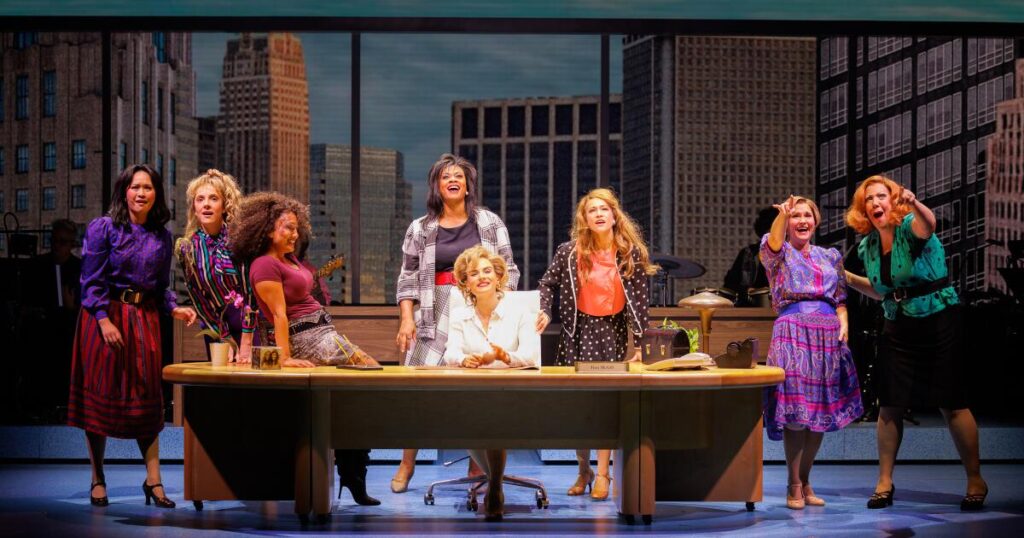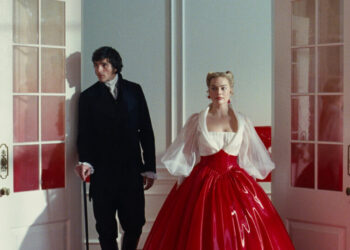What do working girls want? According to the new musical “Working Girl,” based on Mike Nichols’ 1988 film, they mostly want to sing derivative ’80 pop songs and humor themselves with broad comic shtick.
The question that vexed me as I left La Jolla Playhouse, where “Working Girl” is receiving its world premiere, is why must musicals so often cheapen their source material? The production, directed by La Jolla Playhouse outgoing artistic director Christopher Ashley, makes musical comedy seem like the crudest of art forms.
I had high expectations for this show. The creators, Cyndi Lauper (music and lyrics) and Theresa Rebeck (book), seemed ideally suited for the job of turning this cinematic fairy tale about a Staten Island secretary named Tess who fights for her place in the clubby world of corporate finance into an enchanting musical. But commercialism has won out over art, which is to say obviousness has run roughshod over subtlety.
I loved Nichols’ film, written by Kevin Wade, when it first came out. But I was reluctant to challenge my first impression. I didn’t want to find out that what I thought was a terrific comedy was actually the product of a particular New York zeitgeist and an era of Hollywood moviemaking that’s long gone. I hadn’t seen the movie in 37 years when I watched it again before traveling to La Jolla, and I was happy to discover that the movie has retained its freshness.
Nichols elicits magnificent performances from his leads, Melanie Griffith, Harrison Ford and Sigourney Weaver. I don’t know if I’ve ever liked any of them as much as I do here. A young, trim Alec Baldwin, channeling John Travolta in “Saturday Night Fever” and the Brando-Dean example that paved the way, plays a male-chauvinist heel with charming, hedonistic commitment.
There are missteps. Kevin Spacey chews the scenery as a finance bro looking to exploit Tess’ desire to get ahead. Joan Cusack is marvelous despite the rainbow eyeshadow and fire hose of hairspray that turn her character into a cartoon.
Minor parts are given sneaky dimension. There’s divine Olympia Dukakis as a personnel director who becomes Tess’ sly ally and Amy Aquino, who appears at the end of the film, lending grit to an assistant on a similar upward trajectory. Nichols’ genius lies in the individualized textures he savors in characters who are simultaneously types and one-of-a-kind creations.
That touch of quirky singularity is all but missing in Ashley’s generic production. Both the writing and the direction treat the characters like walking gags. Nichols recognized that comedy is funnier when there are human contradictions and conflicts. Weaver’s Katharine, the villain of the piece who steals Tess’ ingenious business idea, is as over-the-top as she is psychologically and morally cagey. She poses as a mentor to Tess, but she’s not about to let some lowly secretary keep her from coming out on top in a man’s world. Weaver masterly balances both sides of the equation.
Joanna “JoJo” Levesque, who plays Tess, and Lesley Rodriguez Kritzer, who plays Katharine, are the standouts in Ashley’s cast. Levesque, who had a No. 1 song on Billboard’s Top 40 Chart and has some of the same lonely striving as Griffith‘s unforgettable Tess, is the main reason to see this production. Lauper’s lyrics allow Tess to get in touch with the feelings behind her dream, her determination not to be defined by where she’s from or how men hungrily look at her.
Unfortunately, her character not only has to deal with a devious boss, a shameless patriarchy and the snobbery of the ruling class but also a musical that speeds through a busy plot with clownish strokes. Kritzer is disappointingly given comic scraps that make her character’s reappearances always seem like an after-thought.
The score is really a collection of unmemorable but weirdly familiar-sounding songs. Lauper won a Tony for her work on “Kinky Boots,” which has better individual numbers but similarly lacks a compositional through line. Here, the music doesn’t so much tell the story as color in the atmosphere with the same heavy-handedness as the garish makeup and poufy hairdos of Tess’ fellow S.I. commuters in this — pardon the pun — ferry tale.
Most of the songs for Tess seem as if Lauper wrote them for herself. At any moment, Levesque seems liable to break out into “Girls Just Want to Have Fun.” Her vocal embellishments uncannily evoke Lauper’s. She would make the character her own if only the material would give her half a chance.
There are echoes of Run-D.M.C. and some arena rock flourishes in the score. Mick (Joey Taranto), Tess’ boyfriend, a galumphing wedding singer who looks as if he’s wearing a Van Halen Halloween costume, is saddled with embarrassing rock numbers that made me wonder if AI might be capable of more originality.
Jack, the investment broker who teams up with Tess in more ways than one, is played by Anoop Desai in a dashing but theatrically underemployed performance. Whenever he’s given a song, it’s a relief that he’s not being overlooked but also a reminder that his character isn’t well integrated into Rebeck’s compressed and hasty book.
The tweaks Rebeck makes to the plot don’t strike me as particularly helpful to the storytelling. In the movie, Tess gently fends off Mick’s proposal after she has walked in on him making love to another woman. In the musical, the cheating scene involves a friend and happens after she has matter-of-factly turned him down in public. Instead of tinkering around the edges, Rebeck should have spent more time reimagining the show’s basic structure.
Ashley Blanchet‘s Cyn, Tess’ best buddy (played by Cusack in the film), stands out from the secretarial pack. But this pivotal friendship is subordinated to the group dynamic. Tess moves with a troop of kooky outer-borough women, leaving the musical with precious few intimate moments of thoughtful stillness. Sarah O’Gleby’s hustling choreography compounds the sense of frenzy.
An image of the Verrazzano-Narrows Bridge is integral to the scenography of the collective AMP featuring Erica Jiaying Zhang. New York is projected throughout the show, but the GPS coordinates are more precisely those of an American musical that has lost its way trying to appeal to the lowest common denominator.
The post ‘Working Girl,’ the musical, is a crude knockoff of ’80s music and style (and the original movie) appeared first on Los Angeles Times.




